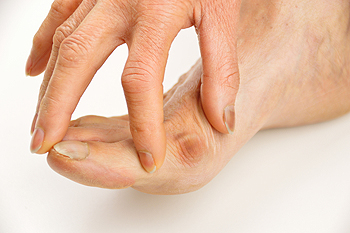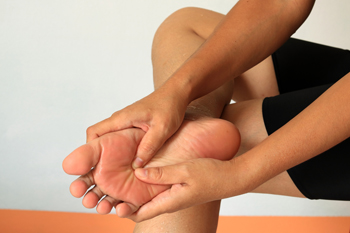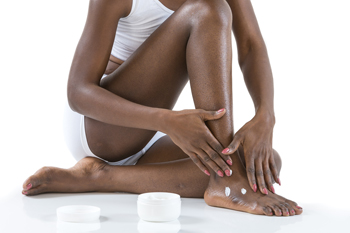Items filtered by date: December 2021
What Is Peripheral Neuropathy?
Peripheral neuropathy is nerve damage within the peripheral nervous system, which communicates with the central nervous system (involving the brain and spinal cord). Diabetes often causes peripheral neuropathy, however, it can also occur due to genetics, infections, injuries, hormonal imbalances, or other medical conditions. Peripheral neuropathy may cause numbness, weakness, muscle twitching or cramps, changes in nails, skin and hair, and a pins-and-needles sensation in the legs and feet. It may also be difficult to maintain balance or feel changes in temperature or pain, and you may experience disturbances in your emotions and sleep patterns. If you have any of these symptoms, it is suggested that you contact a podiatrist. They can help diagnose peripheral neuropathy and manage its symptoms with oral medications, orthotic devices, regular checkups and advice on proper foot care.
Neuropathy
Neuropathy can be a potentially serious condition, especially if it is left undiagnosed. If you have any concerns that you may be experiencing nerve loss in your feet, consult with one of our podiatrists from Centers for Foot & Ankle Care. Our doctors will assess your condition and provide you with quality foot and ankle treatment for neuropathy.
What Is Neuropathy?
Neuropathy is a condition that leads to damage to the nerves in the body. Peripheral neuropathy, or neuropathy that affects your peripheral nervous system, usually occurs in the feet. Neuropathy can be triggered by a number of different causes. Such causes include diabetes, infections, cancers, disorders, and toxic substances.
Symptoms of Neuropathy Include:
- Numbness
- Sensation loss
- Prickling and tingling sensations
- Throbbing, freezing, burning pains
- Muscle weakness
Those with diabetes are at serious risk due to being unable to feel an ulcer on their feet. Diabetics usually also suffer from poor blood circulation. This can lead to the wound not healing, infections occurring, and the limb may have to be amputated.
Treatment
To treat neuropathy in the foot, podiatrists will first diagnose the cause of the neuropathy. Figuring out the underlying cause of the neuropathy will allow the podiatrist to prescribe the best treatment, whether it be caused by diabetes, toxic substance exposure, infection, etc. If the nerve has not died, then it’s possible that sensation may be able to return to the foot.
Pain medication may be issued for pain. Electrical nerve stimulation can be used to stimulate nerves. If the neuropathy is caused from pressure on the nerves, then surgery may be necessary.
If you have any questions, please feel free to contact one of our offices located in Merrillville, Portage, Michigan City/LaPorte, and Schererville, IN . We offer the newest diagnostic and treatment technologies for all your foot care needs.
How Bunions Form
 Bunions are a common foot deformity known as a small, bony lump on the side of the big toe. This bony protrusion usually forms due to the big toe bending towards the smaller toes when it should be straight, thus pushing the bones out of alignment. Bunions gradually form over time and typically get worse without treatment. The angle of the bunion gets sharper, and the bump can grow larger. In severe cases, surgery may be necessary. Bunions may be the result of an inherited mechanical structure, or they may form from wearing shoes that are too tight. Common symptoms of a bunion include pain in the affected area, inflammation, a burning sensation, and possible numbness. It is suggested that larger shoes, or shoes with a wide toe box be worn when you are afflicted with a bunion. Patients who are struggling with this ailment should consult with a podiatrist as soon as possible to determine the best course of treatment.
Bunions are a common foot deformity known as a small, bony lump on the side of the big toe. This bony protrusion usually forms due to the big toe bending towards the smaller toes when it should be straight, thus pushing the bones out of alignment. Bunions gradually form over time and typically get worse without treatment. The angle of the bunion gets sharper, and the bump can grow larger. In severe cases, surgery may be necessary. Bunions may be the result of an inherited mechanical structure, or they may form from wearing shoes that are too tight. Common symptoms of a bunion include pain in the affected area, inflammation, a burning sensation, and possible numbness. It is suggested that larger shoes, or shoes with a wide toe box be worn when you are afflicted with a bunion. Patients who are struggling with this ailment should consult with a podiatrist as soon as possible to determine the best course of treatment.
If you are suffering from bunions, contact one of our podiatrists of Centers for Foot & Ankle Care. Our doctors can provide the care you need to keep you pain-free and on your feet.
What Is a Bunion?
A bunion is formed of swollen tissue or an enlargement of boney growth, usually located at the base joint of the toe that connects to the foot. The swelling occurs due to the bones in the big toe shifting inward, which impacts the other toes of the foot. This causes the area around the base of the big toe to become inflamed and painful.
Why Do Bunions Form?
Genetics – Susceptibility to bunions are often hereditary
Stress on the feet – Poorly fitted and uncomfortable footwear that places stress on feet, such as heels, can worsen existing bunions
How Are Bunions Diagnosed?
Doctors often perform two tests – blood tests and x-rays – when trying to diagnose bunions, especially in the early stages of development. Blood tests help determine if the foot pain is being caused by something else, such as arthritis, while x-rays provide a clear picture of your bone structure to your doctor.
How Are Bunions Treated?
- Refrain from wearing heels or similar shoes that cause discomfort
- Select wider shoes that can provide more comfort and reduce pain
- Anti-inflammatory and pain management drugs
- Orthotics or foot inserts
- Surgery
If you have any questions, please feel free to contact one of our offices located in Merrillville, Portage, Michigan City/LaPorte, and Schererville, IN . We offer the newest diagnostic and treatment technologies for all your foot care needs.
Plantar Warts Can Be Treated!
Several Easy Steps of Foot Care
Caring for your feet is an important part of maintaining your foot health. This can be accomplished through several easy steps. First, you should wash your feet every day with soap and water to keep them clean. Next, dry your feet thoroughly, particularly in between the toes. This helps prevent foot fungus. Afterwards, apply a thick moisturizer to your feet and especially the heels. If you find that you have dry heels, exfoliate them once or twice a month using a wet pumice stone or loofah. Pamper your feet occasionally with a soak in warm water. Finally, make sure that you are wearing comfortable shoes and socks each day. For more information about daily foot care, please consult with a podiatrist.
Everyday foot care is very important to prevent infection and other foot ailments. If you need your feet checked, contact one of our podiatrists from Centers for Foot & Ankle Care. Our doctors can provide the care you need to keep you pain-free and on your feet.
Everyday Foot Care
Often, people take care of their bodies, face and hair more so than they do for their feet. But the feet are a very important aspect of our bodies, and one that we should pay more attention to. Without our feet, we would not be able to perform most daily tasks.
It is best to check your feet regularly to make sure there are no new bruises or cuts that you may not have noticed before. For dry feet, moisturizer can easily be a remedy and can be applied as often as necessary to the affected areas. Wearing shoes that fit well can also help you maintain good foot health, as well as making it easier to walk and do daily activities without the stress or pain of ill-fitting shoes, high heels, or even flip flops. Wearing clean socks with closed shoes is important to ensure that sweat and bacteria do not accumulate within the shoe. Clean socks help to prevent Athlete’s foot, fungi problems, bad odors, and can absorb sweat.
If you have any questions please feel free to contact one of our offices located in Merrillville, Portage, Michigan City/LaPorte, and Schererville, IN . We offer the newest diagnostic and treatment technologies for all your foot and ankle needs.
How Rheumatoid Arthritis Can Affect the Feet
In Rheumatoid Arthritis, the tissue lining within healthy joints is attacked by the body’s own immune system. This is very painful and can lead to joint damage and bone erosion. Rheumatoid Arthritis is a systemic disease, which can occur throughout the entire body. It often affects the feet, toes, and ankles, causing stiffness, pain, and abnormal warmth in joints and ligaments. A person’s quality of life can be affected by Rheumatoid Arthritis as well, since it can often reduce both mobility and the ability to participate in daily activities. When Rheumatoid Arthritis affects the feet, a podiatrist should be consulted to help relieve symptoms, decrease inflammation, and prevent joint damage. Possible treatments a podiatrist may use to treat Rheumatoid Arthritis include rest, medicine, orthotics, physical therapy, and steroid injections.
Arthritis can be a difficult condition to live with. If you are seeking treatment, contact one of our podiatrists from Centers for Foot & Ankle Care. Our doctors can provide the care you need to keep you pain-free and on your feet.
Arthritic Foot Care
Arthritis is a term that is commonly used to describe joint pain. The condition itself can occur to anyone of any age, race, or gender, and there are over 100 types of it. Nevertheless, arthritis is more commonly found in women compared to men, and it is also more prevalent in those who are overweight. The causes of arthritis vary depending on which type of arthritis you have. Osteoarthritis for example, is often caused by injury, while rheumatoid arthritis is caused by a misdirected immune system.
Symptoms
- Swelling
- Pain
- Stiffness
- Decreased Range of Motion
Arthritic symptoms range in severity, and they may come and go. Some symptoms stay the same for several years but could potentially get worse with time. Severe cases of arthritis can prevent its sufferers from performing daily activities and make walking difficult.
Risk Factors
- Occupation – Occupations requiring repetitive knee movements have been linked to osteoarthritis
- Obesity – Excess weight can contribute to osteoarthritis development
- Infection – Microbial agents can infect the joints and trigger arthritis
- Joint Injuries – Damage to joints may lead to osteoarthritis
- Age – Risk increases with age
- Gender –Most types are more common in women
- Genetics – Arthritis can be hereditary
If you suspect your arthritis is affecting your feet, it is crucial that you see a podiatrist immediately. Your doctor will be able to address your specific case and help you decide which treatment method is best for you.
If you have any questions, please feel free to contact one of our offices located in Merrillville, Portage, Michigan City/LaPorte, and Schererville, IN . We offer the newest diagnostic and treatment technologies for all your foot care needs.




